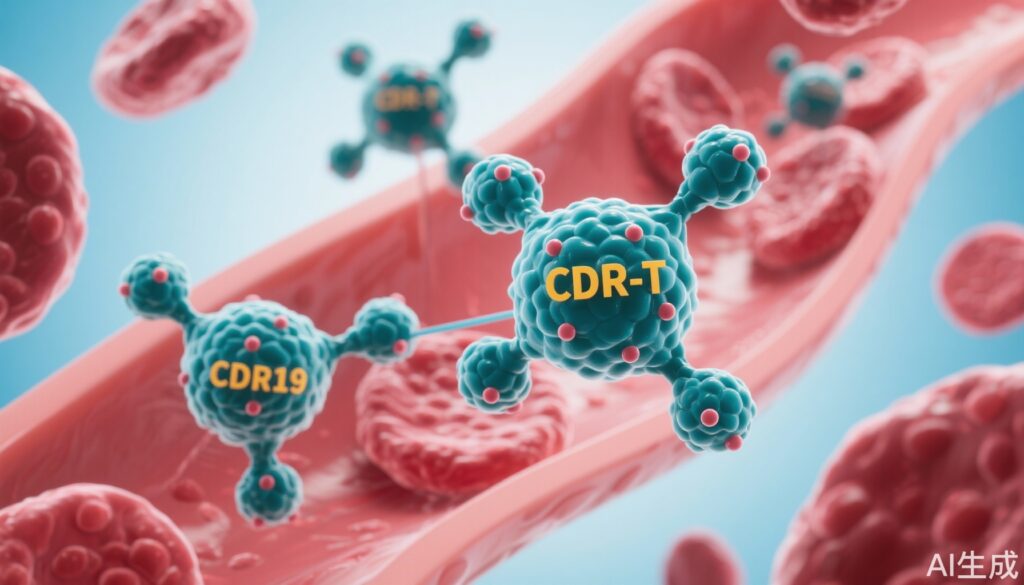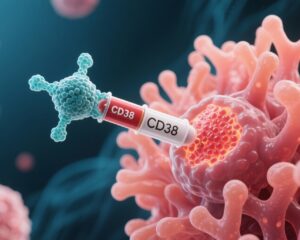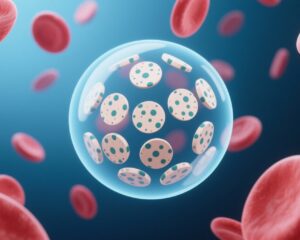Highlight
– ZUMA-8 is a phase 1 clinical trial evaluating brexucabtagene autoleucel (brexu-cel), a CD19-directed CAR T-cell therapy, in patients with relapsed/refractory chronic lymphocytic leukemia (R/R CLL).
– Among 15 heavily pretreated patients, the overall response rate was 47%, with complete responses in 7%, notably higher responses observed in patients with low tumor burden.
– Safety signals were consistent with known CAR T-cell toxicities, including cytokine release syndrome and neurologic events, with one dose-limiting toxicity observed.
– CAR T-cell expansion correlated inversely with pre-leukapheresis lymphocyte counts, suggesting tumor burden may influence therapeutic kinetics.
Study Background and Disease Burden
Chronic lymphocytic leukemia (CLL) is a common adult leukemia characterized by accumulation of malignant B cells. Despite advances, including Bruton tyrosine kinase inhibitors (BTKi) and BCL-2 inhibitors, a subset of patients develops relapsed/refractory disease with limited treatment options and poor prognosis. CAR T-cell therapy, which harnesses a patient’s genetically engineered T cells to target CD19 on B cells, has transformed outcomes in some B-cell malignancies but its application in CLL is ongoing due to challenges with immunosuppressive microenvironment and lower T-cell fitness in these patients. Understanding brexucabtagene autoleucel’s safety and efficacy profile in R/R CLL is critical to expanding cellular immunotherapy options for this challenging population.
Study Design
ZUMA-8 is a multicohort phase 1 study enrolling adult patients with R/R CLL who had received at least two prior systemic therapies including a BTKi. Patients underwent leukapheresis for T-cell collection followed by optional bridging therapy and lymphodepleting chemotherapy with fludarabine and cyclophosphamide. Four cohorts received varying CAR T-cell doses and patient selection criteria:
– Cohort 1: 1 × 10^6 CAR T cells/kg (n = 6)
– Cohort 2: 2 × 10^6 CAR T cells/kg (n = 3)
– Cohort 3: Low tumor burden with 1 × 10^6 CAR T cells/kg (n = 3)
– Cohort 4A: Postibrutinib treatment with 1 × 10^6 CAR T cells/kg (n = 3)
The primary endpoint was safety, including dose-limiting toxicities (DLTs), and secondary endpoints focused on overall response rates (ORR), complete response (CR) rates, durability, and CAR T-cell expansion kinetics. Median patient age was 63 years with a range of 52 to 79 years, representing a heavily pretreated population.
Key Findings
Safety outcomes demonstrated that brexu-cel’s adverse event profile was consistent with other CAR T-cell therapies targeting CD19. Among the 15 treated patients, one DLT occurred in cohort 3 manifesting as grade 4 cytokine release syndrome (CRS), a known inflammatory toxicity characterized by fever and organ dysfunction. Neurologic toxicities of grade 3 or greater affected three patients (20%), highlighting manageable but significant risks that require vigilant monitoring.
Efficacy analysis revealed an ORR of 47%, with one patient (7%) achieving CR. Notably, cohort 3 with low tumor burden showed promising responses, with all three patients responding and one achieving CR. This suggests that tumor burden at infusion may critically affect treatment efficacy, possibly by influencing CAR T-cell expansion and function.
CAR T-cell kinetics were evaluated, demonstrating measurable expansion in 27% of patients. An inverse correlation was seen between absolute lymphocyte count prior to apheresis and CAR T-cell expansion, implying that lower circulating leukemic cells might foster better CAR T-cell proliferation post-infusion.
These findings confirm brexu-cel’s safety in R/R CLL without new unexpected toxicities and provide preliminary evidence of efficacy, especially in patients with lower disease burden. This represents a significant step forward considering the limited treatment options in this refractory population.
Expert Commentary
Dr. Michael S. Davids and colleagues highlight that ZUMA-8 provides important safety and activity data for brexucabtagene autoleucel in a heavily pretreated CLL cohort including those previously exposed to BTKi therapy. The observation that lower tumor burden associates with improved CAR T-cell expansion and responses aligns with immunobiological principles and previous experience in other B-cell malignancies. However, the small sample size and patient heterogeneity warrant cautious interpretation and mandate larger studies to confirm these promising early signals and refine patient selection criteria.
The management of CRS and neurotoxicity remains paramount in the clinical application of CAR T-cell therapies and the observed toxicities underscore the need for experienced centers and standardized protocols. The potential of brexu-cel to induce durable remission could shift the treatment paradigm for R/R CLL pending confirmatory phase 2/3 data.
Conclusion
The ZUMA-8 phase 1 study establishes brexucabtagene autoleucel as a feasible and potentially effective CAR T-cell therapy for patients with relapsed/refractory CLL, particularly those with lower tumor burden. The manageable safety profile and encouraging response rates support further clinical development and optimization of dosing strategies. Future trials should explore combined approaches, mechanisms to enhance CAR T-cell expansion, and long-term outcomes to integrate this modality into standard CLL treatment algorithms.
References
Davids MS, Kenderian SS, Flinn I, Hill BT, Maris M, Ghia P, Byrne M, Bartlett NL, Pagel JM, Zheng Y, Kanska J, Zhang W, Granados E, Pinilla-Ibarz J. ZUMA-8: a phase 1 study of brexucabtagene autoleucel in patients with relapsed/refractory chronic lymphocytic leukemia. Blood. 2025 Aug 21;146(8):938-943. doi: 10.1182/blood.2024027460. PMID: 40209059.



